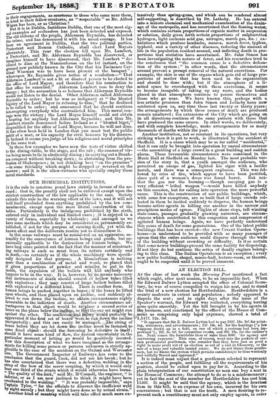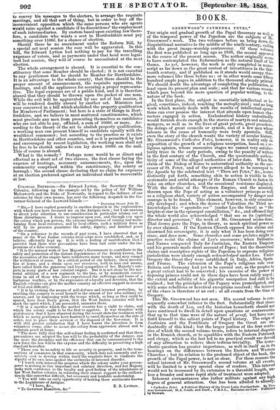AN ELECTION BILL.
'AT the close of last week the Morning Post mentioned. a fact which ought, after next session, to be an impossible fact. When Sir Edward Bulwer Lytton accepted the office of Colonial Secre- tary, he was of course compelled to resign his seat, and to stand the trial of a new election for Hertfordshire. Hertfordshire is a county moderate in extent and population ; nobody appeared to dispute the seat ; and in eight days after the issue of the Speaker's warrant, Sir Edward was reelected, everything having gone quite smoothly. Yet the bill brought in by his agents in the business, and sanctioned by the officer of the House of Com- mins as comprising only legal expenses, showed a total of r1,147/. 12s. M. " It appears that Sir E. Bulwer Lytton had to pay 1921. 18s. 9d. for print- ing, stationery, and advertisements ; 731. 10x. 4d. for the hustings (' a few waggons drawn up in a field, on one of which a rostrum had been im- provised'); 221. 38. 6d. for committee rooms, and 291. 19s. for the auditor's fee. Next comes the formidable item of more than 8001. `for agency and canvassing expenses.' This sum, of course, went into the pockets of cer- tain professional gentlemen, who consider that they have just as good a right to make profit out of an election as out of a suit in Chancery, or the sale of a large and valuable landed estate. We do not blame these gentle- men, but we blame the system which permits candidates to be thus wantonly and wilfully 'fleeced and oppressed." It is indeed most unjust that a gentleman selected to represent a section of the; people, and fulfilling all the requirenients of his position, should be called upon to pay for it. According to the plain interpretation of our constitution no man can buy a seat in the Houseiof..Commons ; the attempt to do so is a misdemeanour i yet in fact' he seat of the member for Hertfordshire has cost him 11501. It- might be said that the agency, which is the heaviest item in this bill, is an expense of his own, incurred for his own convenience ; but that is not the truth. A men desiring to re- present such a constituency must not only employ agents, in order to convey his messages to the electors, to arrange the requisite meetings, and all that sort of thing, but in order to buy off the inconvenient opposition which the same persons who are agents would raise against a candidate if he discontinue(' the employment of such intermediaries. By custom based upon existing law there- fore, a candidate who wants a seat in Hertfordshire must pay something over 11001. for a chance of election.
Should there be no amendment under the Reform Bill, by a special act next session the case will be aggravated. In this bill, Sir Edward Lytton had nothing to pay for the travelling expenses of voters, and as payments under that head were legal- ised last session, they will of course be necessitated at the next election. The whole arrangement is absurd. It is essential to the con- stituency that some Member should be elected ; it is not essential to any gentleman that he should be Member for Hertfordshire. It is an advantage to the whole county, that there should be the proper amount of announcement, the requisite apparatus, the hustings, and all the appliances for securing a proper representa- tive. The legal expenses are of a public kind, and it is therefore absurd that they should be thrown upon the pocket of one man. While the evil will be aggravated by one act of last session, it will be rendered doubly absurd by another act. Ministers fast year concurred in a bill which abolished the property qualification for Members of Parliament ; but here is a state of things in Hert- fordshire, and we believe in most scattered constituencies, which must preclude any men from presenting themselves as candidates who are not able to pay, offhand, a sum of 10001. or more. Ac- cording to the theory of the act to abolish property qualification, a working man can present himself as candidate equally with the wealthiest commoner ; but according to the practice as it exists in Hertfordshire and other counties, and as it is permitted by law and encouraged by recent legislation, the working man shall not be free to be elected unless he can lay down 10001. on the nail. This of course is absurd.
What is the remedy ? Perhaps none would be so direct and effectual as a short act of two clauses, the first clause laying the expense of hustings, necessary announcements, &c., upon the community comprised 'within the constituency, the county or borough ; the second clause declaring that no claim for expenses at an election preferred against an individual shall be recoverable at law.



























 Previous page
Previous page